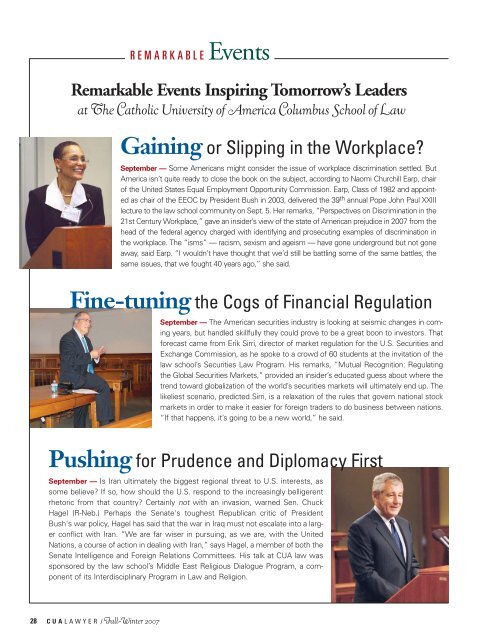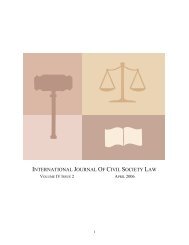CUA Cover Winter 2005 final (Page 2) - Columbus School of Law
CUA Cover Winter 2005 final (Page 2) - Columbus School of Law
CUA Cover Winter 2005 final (Page 2) - Columbus School of Law
- No tags were found...
Create successful ePaper yourself
Turn your PDF publications into a flip-book with our unique Google optimized e-Paper software.
REMARKABLEEventsRemarkable Events Inspiring Tomorrow’s Leadersat The Catholic University <strong>of</strong> America <strong>Columbus</strong> <strong>School</strong> <strong>of</strong> <strong>Law</strong>Gaining or Slipping in the Workplace?September — Some Americans might consider the issue <strong>of</strong> workplace discrimination settled. ButAmerica isn’t quite ready to close the book on the subject, according to Naomi Churchill Earp, chair<strong>of</strong> the United States Equal Employment Opportunity Commission. Earp, Class <strong>of</strong> 1982 and appointedas chair <strong>of</strong> the EEOC by President Bush in 2003, delivered the 39 th annual Pope John Paul XXIIIlecture to the law school community on Sept. 5. Her remarks, “Perspectives on Discrimination in the21st Century Workplace,” gave an insider’s view <strong>of</strong> the state <strong>of</strong> American prejudice in 2007 from thehead <strong>of</strong> the federal agency charged with identifying and prosecuting examples <strong>of</strong> discrimination inthe workplace. The “isms” — racism, sexism and ageism — have gone underground but not goneaway, said Earp. “I wouldn’t have thought that we’d still be battling some <strong>of</strong> the same battles, thesame issues, that we fought 40 years ago,” she said.Fine-tuning the Cogs <strong>of</strong> Financial RegulationSeptember — The American securities industry is looking at seismic changes in comingyears, but handled skillfully they could prove to be a great boon to investors. Thatforecast came from Erik Sirri, director <strong>of</strong> market regulation for the U.S. Securities andExchange Commission, as he spoke to a crowd <strong>of</strong> 60 students at the invitation <strong>of</strong> thelaw school’s Securities <strong>Law</strong> Program. His remarks, “Mutual Recognition: Regulatingthe Global Securities Markets,” provided an insider’s educated guess about where thetrend toward globalization <strong>of</strong> the world’s securities markets will ultimately end up. Thelikeliest scenario, predicted Sirri, is a relaxation <strong>of</strong> the rules that govern national stockmarkets in order to make it easier for foreign traders to do business between nations.“If that happens, it’s going to be a new world,” he said.Pushing for Prudence and Diplomacy FirstSeptember — Is Iran ultimately the biggest regional threat to U.S. interests, assome believe? If so, how should the U.S. respond to the increasingly belligerentrhetoric from that country? Certainly not with an invasion, warned Sen. ChuckHagel (R-Neb.) Perhaps the Senate's toughest Republican critic <strong>of</strong> PresidentBush's war policy, Hagel has said that the war in Iraq must not escalate into a largerconflict with Iran. “We are far wiser in pursuing, as we are, with the UnitedNations, a course <strong>of</strong> action in dealing with Iran,” says Hagel, a member <strong>of</strong> both theSenate Intelligence and Foreign Relations Committees. His talk at <strong>CUA</strong> law wassponsored by the law school’s Middle East Religious Dialogue Program, a component<strong>of</strong> its Interdisciplinary Program in <strong>Law</strong> and Religion.28<strong>CUA</strong>LAWYER /Fall–<strong>Winter</strong> 2007
















